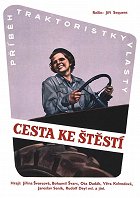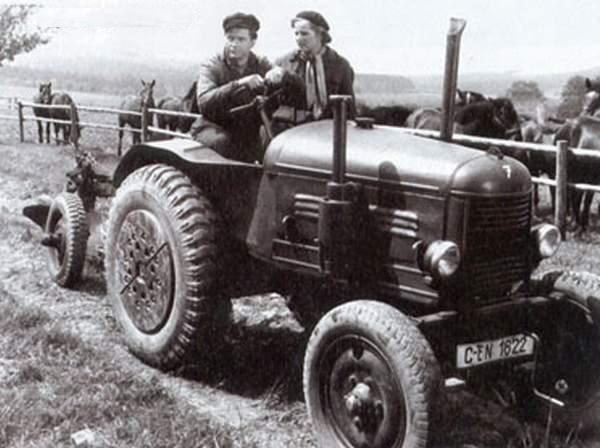Reżyseria:
Jiří Sequens st.Zdjęcia:
Václav PazderníkMuzyka:
Jiří SrnkaObsada:
Jiřina Švorcová, Bohumil Švarc st., Otakar Dadák, Věra Kalendová, Jaroslav Seník, Vladimír Hlavatý, Ella Nollová, Antonín Šůra, Jaroslav Lokša (więcej)Opisy(1)
Vlasta Tomešová is returning to her home village from the voluntary youth brigade and is determined to become a tractor-driver. Her father is one of the few people who didn't join the farming cooperative and rejects his daughter's plan. Tomeš is influenced and shamelessly used by Fulín, the richest farmer in the village. Vlasta joins the tractor station risking a conflict with her father. The garage attendant has his objections as well, because his wife also wants to be emancipated. Vlasta's friendship with the tractor-driver Olda is growing into a love relationship. Vlasta becomes a tractor-driver and has her first ploughing job with Fulín himself. But, her malicious colleague Pepek secretly emptied the petrol tank in her tractor, and Vlasta gets stuck in the field. Fulín uses this situation as an excuse to refuse to lend Tomeš a promised pair of horses. Vlasta, with the help of her friends, ploughs her father's fields during an extended night shift. Tomeš already realized Fulín's meanness and, after being reconciled with his daughter, he joins the cooperative. Vlasta persuades the members of the cooperative of the necessity to join up the small fields. In the end, everybody comes together and ceremonially ploughs away the field boundaries. (oficjalny tekst dystrybutora)
(więcej)Recenzje (1)
A typical example of the propaganda film genre that permeated the entire culture of Czechoslovak social realism. Sequens takes over the character and story constants of the village drama – the clash between the old world (the world of landowners and their vassals) and the new world (the world of the tractor station) is transferred to the level of standardized heroes. Enthusiastic village girl Vlasta underwent an ideological initiation on the construction of youth and brings the message of the new order to the village, which refuses to give up the relic of old times – borders. I was quite disappointed by the performance of the negative characters, which, unlike literary works, has no energy in the Way Leading to Happiness and remains only with the wooden-bile landowner Fulín. However, this shortcoming is balanced by the tractor station team with all the sublimated erotica, mechanized expression and prescription enthusiasm. The key motif of the Way Leading to Happiness is the tractor as a contradiction of the horse (old world). The Zetor peace tank is a true messenger of the new order, an initiating tool and a ubiquitous companion of man. Its people are exemplary models of the "new humanity" according to the aesthetic and ideological norm of the time period. The culminating examples of the incorporated ideology are the scenes of mass singing, particularly the Chastushka cited by Lomoz, whose tone is almost sacral. The pathos of the film is sometimes ridiculous (all of the double meanings with the fulfillment of the norm that are cute from today's point of view), sometimes freezing (the viewing of Vlasta's father to the sound of the tractor-cultural choir is almost pathological). The comic creation of Rudolf Deyl Jr., whose warehouseman Karásek embodies a comic archetype so typical of Czech social realism, should also be considered a typical prop. From a formal point of view, the Way Leading to Happiness is a terrible, amateur film, poorly constructed, disharmonious, playing out in the coveted naivety of Jiřka Švorcová and her comrades. However, from today's point of view, the content is so burdened with the seed of ideology that it breathes something mystical onto the viewer, as if he were watching the initiation ritual of a bizarre cult. As a person familiar with contemporary newspeak and the emblematic language of art, I had a lot of fun with the obvious and coded sense. The film is impressive and it cannot be evaluated.
()

